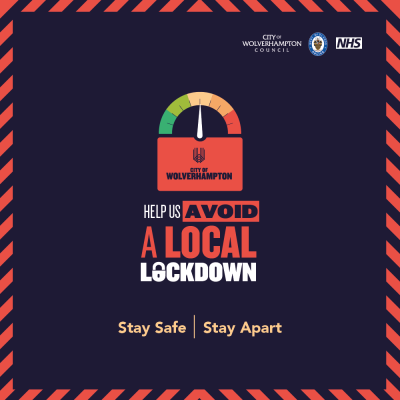Latest figures reveal there were an average of 15.26 cases per 100,000 residents over the 7 days to 1 August, up from 14.49 cases a week before and above the national average of around 8 cases per 100,000 people. The majority of these new cases have been linked to family clusters or contacts of known cases.
Wolverhampton’s Director of Public Health John Denley said: "The increase in cases in Wolverhampton over the last couple of weeks show that Covid-19 remains prevalent in the city and reminds us just how easy the virus can spread, particularly within households and from one family to another.
"We've also noticed that many of these new cases are asymptomatic, meaning that individuals have not had symptoms at the time of their test.
"It's important we identify them, because people without symptoms can still pass on the virus. That’s why we're shifting towards more proactive testing for people who may be asymptomatic but are in health and social care settings and workplace or community settings where they may be at greater risk of contracting Covid-19.
"We have been promoting this proactive testing and the increase in cases is partly a result of this.
"We are reviewing a range of other indicators to give us a fuller picture of coronavirus activity in the city and at present we still believe that the risk to the community remains low – but we need to ensure it stays that way and avoid a local lockdown.
“That’s why we must take collective responsibility in combatting the virus by observing social distancing, wearing face coverings in enclosed public spaces and regularly washing our hands for at least 20 seconds.
"If you have got symptoms of Covid-19 – a high temperature, a new, continuous cough, or loss or change to your sense of smell or taste – or if you feel you may have been exposed to someone with Covid-19, you must self-isolate for at least 10 days, including from members of your own household if at all possible. You also need to arrange a test as soon as possible by visiting GOV.UK or calling 119."
The test is quick and free, and involves taking a swab of the inside of the nose and the back of the throat with a long cotton bud. Anyone who tests positive for Covid-19 will be contacted by NHS Test and Trace and will be asked to share information about people that have been close contacts recently.
People can also use the Royal Wolverhampton NHS Trust's Ask A&E tool at to input and monitor their symptoms and speak to a healthcare professional via video chat if required.
The latest information and guidance around coronavirus is available at GOV.UK and on the council’s own coronavirus pages at Coronavirus advice and information. There’s lots of advice on how people can protect themselves and their families from coronavirus from the NHS at Coronavirus (COVID-19).
The council’s Stay Safe, Be Kind campaign offers clear and simple advice about how people can help themselves, and how they can support others who may be particularly vulnerable at this time. For more information, please visit Stay Safe, Be Kind.
